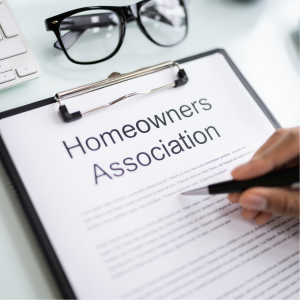
Understanding HOA Laws in Vancouver, Washington
Knowing the laws of homeowners’ associations (HOAs) is essential for homeowners in Vancouver, Washington. Within this area, HOAs have distinct rights and duties given by law and the association’s bylaws, such as the CC&Rs, Covenants, Conditions, and Restrictions.
These documents explain the enforcement of property upkeep, community standards, and payments of dues or assessments. An HOA may lien a property because of unpaid dues, and foreclosure–a last resort–must abide by laws that protect homeowners’ rights.
Residents must familiarize themselves with their rights and obligations under these rules to navigate any disputes effectively. Knowing how Washington state law interacts with local HOA policies will aid homeowners in safeguarding their property from potential extreme actions taken by an HOA.
The Impact of State and Local Laws on Homeowner Associations
In Vancouver, Washington, state and local regulations shape the functioning of homeowner associations (HOAs), particularly the limits of their authority on foreclosing properties. These regulations delineate the HOA’s jurisdiction concerning rule enforcement, collection of dues, HOA obligations, and delineation of the homeowners’ privileges and responsibilities.
In the State of Washington, some laws govern an HOA’s budget and finances and provide guidelines concerning HOAs’ finances. These laws set minimum standards of equity and fairness among the homeowners and resolve disputes between homeowners and the associations. There might also be some local laws that govern the conduct of the HOAs, which would affect the operations concerning the maintenance of shared facilities and the management of unpaid dues.
Legal conflicts with an HOA, especially when foreclosure looms because of unpaid dues, demand that homeowners carefully consider legal frameworks. Foreclosure grips an HOA’s lien on the dwelling, so homeowners stand to gain by learning about state legislation and local rules. Knowledge of the law enables homeowners to shield their property rights and enables skillful dealings with the HOA.
Contact us today for a fair offer and guidance tailored to your situation—our team is ready to help you navigate HOA challenges in Vancouver, Washington.
Exploring the Powers and Limitations of HOAs in Washington State
Homeowners associations (HOAs) in Washington State wield significant authority, but their powers are unlimited. Such organizations have the authority to govern compliance to maintain the community’s property values and the neighborhood’s standards.
An HOA must legally follow a prescribed step-by-step process for taking a person’s house. While an HOA can place a lien against a property for outstanding dues in Washington State, foreclosing on a property is a more complicated process governed by the state’s legal requirements.
In extreme cases, a homeowner is protected by a state statute that sets the perimeter for taking action. These homeowners, for instance, from Vancouver must know both the powers of the HOA and the boundaries of the rights within the governed community.
Familiarity with governing documents, such as CC&Rs (Covenants, Conditions, and Restrictions), is crucial for navigating potential disputes and safeguarding one’s home from unwarranted claims by an HOA.
Understanding the Governing Documents of Your HOA
Understanding the governing documents of your Homeowners Association (HOA) is crucial if you’re concerned about whether an HOA in Vancouver, Washington, can take your house. One such governing document is the “Covenants, Conditions, and Restrictions” (CC&Rs) of the community, along with the association’s regulations and governing bylaws.
The CC&Rs restrict what alterations can be made and what activities can be undertaken by the owners of the housing units. Enforcement of the restrictions is in accordance with the homeowners’ association (HOA). Meetings and other organizational activities, including decision-making processes, are clearly defined in the bylaws, and, as such, the HOA has its own rules for governing them.
Provided rules and guidelines detail the limits every homeowner is expected to observe within the community. These documents stating the HOA’s powers, alongside the responsibilities vested in you as a homeowner, make it crucial to know and understand the commands set forth.
Knowing if any clauses concerning penalties, liens, or foreclosure would affect your homeownership rights is wise. Shaping your understanding of these laws will go a long way toward helping you manage disputes or compliance challenges with the HOA, ensuring your home is not wrongfully encumbered.
The Role of CC&RS (covenants, Conditions, and Restrictions) in HOAs

Covenants, Conditions, and Restrictions (CC&Rs) are indispensable in managing Homeowners Associations (HOAs) in Vancouver, Washington. CC&Rs are legal documents that describe the rights and responsibilities of the association’s members, including building, maintenance, and operational restrictions.
Preserving the value of the homes and ensuring harmony in the community’s visual appearance are the goals of the stipulated rules. To reinforce the CC&Rs, HOAs are permitted to impose fines and other sanctions on homeowners who breach the CC&Rs.
A homeowners’ association (HOA) may take legal action that can result in foreclosure if a homeowner does not resolve violations or pay fines due to them. Focusing on the community’s specific CC&Rs terms will enable homeowners to avoid property disputes and protect their rights.
Residents need to know how these governing documents can impact their ownership rights and what recourse they have if faced with enforcement actions by the HOA.
Legal Rights of Homeowners in HOA Communities
Navigating disputes with the homeowners’ association in the HOA villages of Vancouver, Washington, may leave some residents wondering what legal recourse or provisions they have. The good news is that while HOAs have some authority, they cannot automatically take your house.
Washington state law provides specific protections for homeowners. These laws require HOAs to operate within the boundaries set by their governing documents, such as the Declaration of Covenants, Conditions, and Restrictions (CC&Rs), bylaws, and rules.
Homeowners have the right to access specific documents, which they must read to appreciate their roles, duties, and rights. All Homeowners Associations (HOAs) claim infringements; however, enforcement action cannot be taken without following the mandated procedure.
Due process includes, but is not limited to, informing parties of a breach of the stipulated rules, presenting an impartial hearing, and informing them of a hearing within a specific timeframe. In addition, an HOA cannot impose penalties or place a lien on a property for unpaid dues, contested fees, or other disagreements without following legal due process.
If needed, homeowners can dispute unreasonable actions by mediation or legal action. Knowing these legal rights enables homeowners residing in HOA communities to defend their property rights against unwanted actions by a controlling association.
Protecting Your Property Rights Within an HOA Framework
Suppose you reside in a Homeowners Association (HOA) in Vancouver, Washington. In that case, you should know the boundaries or protocols in which the HOA operates regarding your home based on your property rights. An HOA functions based on rules known as Covenants, Conditions, and Restrictions (CC&Rs), which homeowners accept and comply with.
While the HOA community upholds a standard of living, and compliance with the HOA rules may lead to fines or even legal action imposed, the HOA does not have the right to claim ownership of your house. The only circumstance in which the HOA would claim a home would be due to unpaid compulsory dues or assessments. In such a situation, the HOA has the authority to place a lien on the house, which could lead to foreclosure in extreme circumstances.
Owners should know their legal rights under Washington state law and within their specific HOA regulations. Understanding these will aid them in resolving disputes or enforcement actions while preserving their property interests within the HOA framework.
If you’re facing HOA challenges or worried about liens on your property in Vancouver, Washington, Sell With Isaac can help. We provide fair cash offers and a fast, hassle-free sale, giving you peace of mind and a fresh start.
Financial Responsibilities of Living in an HOA Community
Residents of an HOA community in Vancouver, Washington, should be aware of particular community obligations, particularly HOA fines. Homeowners Association (HOA) fees are one of the most important obligations and are primarily used to maintain community amenities such as swimming pools, clubhouses, and landscaping.
These fees are significant, as sharing amenities such as clubhouses and pools and the community’s size significantly impact the range of HOA fees. Besides the structured dues, HOA fines can also come from emergency expenses. These emergency funds come from significant remodel expenses that involve rough repairs.
Maintaining HOA dues is vital for maintaining goodwill with the HOA, and falling behind with HOA payments can lead to fines or even HOA litigation. Specific homeowners’ associations could place a lien on your house for unpaid dues or HOA fines. If left unresolved, escalation to foreclosure proceedings is also a possibility.
Knowing these obligations clearly defines your boundaries as a homeowner within your HOA and protects your rights as a homeowner.
Financial Management Strategies for Avoiding Delinquency in HOAs

Implement sound financial management strategies to effectively manage your finances and avoid delinquency in a homeowners association (HOA) in Vancouver, Washington. Create a detailed budget for all regular expenses, including HOA fees, mortgage payments, utilities, and maintenance costs.
Prioritize the payment of HOA dues so that they are made every month. Set automatic payments for the dues to avoid payment delays, which may lead to late fees. This will also help maintain a good relationship within the community.
Setting up an emergency fund is also a good option if funds are depleted. These funds will mitigate the impact of falling behind on payments. Most importantly, if you foresee difficulties honoring obligations, inform the HOA board promptly to work out arrangements to help with the financial stress.
Being updated with any changes within the fee structures or special assessments helps alleviate any unplanned expenses from financial pressure. If you proactively manage your budget and maintain communication with your HOA, you can protect your house from legal consequences due to unpaid dues.
How HOAs Can Enforce Property Rules and Regulations
In Vancouver, Washington, Homeowners Associations (HOAs) have the authority to enforce community standards for property and the community. Such associations often function with covenants, conditions, and restrictions (CC&Rs) that homeowners accept upon buying a house in the community.
Fines can be levied for various infractions, improper landscaping, alterations to the house’s exterior, and more. The HOA is authorized to place a lien on the property if fines and penalties accrue and remain unpaid.
Further deterioration of compliance or payment of dues can lead to more serious issues, including the possibility of foreclosure. Homeowners must know their rights and obligations outlined in the HOA’s governing documents.
Engaging in open communication with the association and attending meetings can help residents stay informed about any policy changes or enforcement actions that might impact their property ownership rights in Vancouver, Washington. Cash house buyers in Vancouver and other cities in Washington can provide a fast and hassle-free solution for those looking to sell quickly.
Common Reasons for HOA-driven Foreclosures
In Vancouver, Washington, a homeowner’s association can begin foreclosure proceedings on a property if the owner does not fulfill specific obligations. Foreclosure by the HOA is most commonly triggered by unpaid assessments or dues, which are essential for the upkeep of the community’s facilities and services.
Neglecting to pay these financial obligations can result in a lien being placed on the property, risking foreclosure if the lien is not cleared. Foreclosure could also result from breaches of the HOA’s rules and regulations.
If a homeowner consistently ignores community guidelines or refuses to remedy violations despite repeated notices and fines, the HOA may pursue legal action to enforce compliance. Additionally, special assessments for unexpected repairs or improvements can strain homeowners financially, increasing the risk of delinquency and subsequent foreclosure.
Understanding these common triggers helps homeowners navigate their rights and responsibilities within HOA-governed communities to prevent losing their homes.
Steps Homeowners Take Before Foreclosure in Washington State
Homeowners’ associations (HOAs) in Washington State must follow specific steps before initiating foreclosure on a property. Initially, the HOA will notify the homeowner of any outstanding dues or violations, providing an opportunity to resolve the issue.
If the debt remains unpaid, the HOA can place a lien on the property, serving as a legal claim for the amount. This lien is recorded with the county, warning that foreclosure may occur if obligations are not met.
The next step involves sending formal notices to inform homeowners about impending foreclosure proceedings. These communications typically outline all outstanding amounts and necessary actions to rectify the situation.
HOAs are required by law to adhere to state-specific regulations governing notice periods and communication methods throughout this process. Mediation options might be available to negotiate payment plans or resolve disputes before escalating to foreclosure.
If unresolved, the HOA can file for judicial foreclosure through court action. A judge will review and decide whether to grant permission to sell the property at auction to recover debts owed by the homeowner.
Homeowner Protections Against HOA Foreclosure Actions

Homeowners in Vancouver, Washington, facing the possibility of foreclosure by a Homeowners Association (HOA) should be aware of their legal rights and protections. Under Washington state law, HOAs can place a lien on a property for unpaid dues or assessments. Still, strict regulations govern how and when they can initiate foreclosure proceedings.
Homeowners must understand that an HOA must follow specific legal procedures before attempting to foreclose on a home. This includes providing adequate notice to the homeowner about the delinquency and offering opportunities to resolve the debt.
Additionally, state laws often require that the amount owed meet a certain threshold before an HOA can proceed with foreclosure actions. Homeowners are encouraged to communicate openly with their HOA and seek legal advice if they receive any notices regarding potential foreclosure.
For those who may decide that selling their property is a better option, working with a company that buys homes in Camas and surrounding Washington cities can provide a quick, hassle-free solution to avoid the stress of foreclosure.
Navigating Disputes with Your Homeowners Association
When dealing with disputes involving your Homeowners Association (HOA) in Vancouver, Washington, it’s crucial to understand your rights and the potential consequences. An HOA plays a significant role in maintaining community standards, but it can also impose fines and take legal action if homeowners fail to comply with established rules.
To effectively navigate these conflicts, start by reviewing your HOA’s governing documents, such as the Covenants, Conditions, and Restrictions (CC&Rs), which outline your responsibilities and rights. Familiarize yourself with the procedures for resolving disputes and any potential penalties that might be enforced.
Communication is key; consider addressing concerns directly with the HOA board or management company through formal channels. If issues persist, mediation or arbitration might be viable options before considering litigation.
Understanding state laws about HOAs in Washington can also provide insight into how disputes are typically handled and whether an HOA can ultimately pursue foreclosure on a property due to non-compliance or unpaid dues. Seeking legal advice from an attorney experienced in real estate law may further clarify your position and help protect your home from unwarranted actions by the association.
Can an HOA Take Your Home in Washington State?
Homeowners associations (HOAs) in Washington State have significant authority when enforcing community rules and collecting dues. Still, whether an HOA can take your house is a serious concern for homeowners. In Washington State, HOAs can place a lien on a property if a homeowner fails to pay their dues or fines.
This lien could lead to foreclosure if the debt remains unpaid, meaning that, technically, under certain circumstances, an HOA can initiate proceedings that could take your home. However, this process involves specific legal steps and must comply with state laws to protect homeowners’ rights.
Understanding these rights is crucial; homeowners should know that while HOAs have power, they are also bound by regulations that prevent arbitrary or unjust actions. Homeowners in communities governed by HOAs must stay informed about their responsibilities and any changes in HOA policies.
Consulting with a real estate attorney can help homeowners handle disputes with an HOA and ensure they are fully aware of their rights and obligations under Washington State law.
What Power Does HOA Have in Washington State?
Homeowners Associations (HOAs) in Washington State, including those in Vancouver, have specific powers and responsibilities that can significantly impact property owners. HOAs are typically granted authority through a community’s covenants, conditions, and restrictions (CC&Rs).
In Washington State, an HOA can enforce rules concerning property maintenance, architectural standards, and community behavior to maintain property values and community aesthetics. However, the power of an HOA is not unlimited.
They must operate within the legal framework established by state laws such as the Washington Uniform Common Interest Ownership Act (WUCIOA), which outlines the rights of homeowners and limits on what HOAs can do. For instance, while an HOA can levy fines for rule violations or unpaid dues, it cannot arbitrarily seize a home without due process.
In extreme non-compliance or unpaid assessments, an HOA may place a lien on a property and potentially foreclose. However, this process involves strict legal procedures to protect homeowners’ rights.
Understanding these powers helps residents navigate their relationship with their HOA and ensure their rights are protected under Washington law.
Need to sell your house fast? Skip repairs and hassles—we’ll buy it as-is for cash. Sell With Isaac handles everything for a smooth, stress-free sale. Call us at (360) 207-4133 for a no-obligation offer today!
| HOMEOWNER’S ASSOCIATION | HOMEOWNERS’ ASSOCIATIONS | FORECLOSURE AUCTION | MEMBER OF THE BOARD | BOARD OF DIRECTORS | BUDGETS |
| ANNUAL BUDGET | INFORMATION | LAWYER | ENERGY | SOLAR ENERGY | MONEY |
| MORTGAGE RATES | HOMEBUYING | HOME LOAN | MORTGAGE LENDER | MORTGAGE LENDING | FLAG |
| CONDO | CONDOMINIUMS | DROUGHT | DROUGHT CONDITIONS | MEDIATOR | LOANS |
| LENDING | LIABILITY | LIABILITIES | CIVILLY LIABLE | ATTORNEYS’ FEES | UNITED STATES |
| THE UNITED STATES | REAL PROPERTY | INSURANCE | BUSINESS INSURANCE | INSURED | TELEPHONE |
| FLAG OF THE UNITED STATES | EXPENDITURES | RISKS | DEED | CONSTRUCTION | ARBITRATOR |
| NONCOMPLIANCE | MINUTES | FIRST-CLASS MAIL | LAWSUIT | PERSONS WITH DISABILITIES | DISABILITY |
| REFINANCE | REFINANCING | LEGAL ASSISTANCE | LEGAL AID | JURISDICTION | HOTLINE |
| HEALTH | FINANCIAL STATEMENT | CASH | BLOG | BLOG POST | VEGETATION |
| GRASS | LAWNS | FAIR HOUSING ACT | FAIR HOUSING | GOOD FAITH | CORPORATION |
| ASSETS | ARTICLES OF INCORPORATION | TRANSPARENCY | TERMS OF USE | TAXES | TAX |
| NEGOTIATION | MARKETING | COVENANTS CONDITIONS AND | COVENANTS, CONDITIONS, AND RESTRICTIONS |
Helpful Vancouver Blog Articles
- Sell A House With A Lien In Vancouver, WA
- How To Switch Real Estate Agents In Vancouver, WA
- Understanding HOA Fee Responsibility at Closing in Vancouver, WA
- Closing Costs For Selling A Home Without A Realtor In Vancouver, WA
- Pros And Cons Of Selling Your Vancouver, WA Home Below Market Value
- Putting a Tenant-occupied Home on the Market in Vancouver, WA
- Listing a Home in Need of Repairs in Vancouver, WA
- Selling A Foreclosure Home In Vancouver, WA
- Uncovering The Cost Of Home Staging In Vancouver, WA
- Can An HOA In Vancouver, Washington, Take Your House?
- The Sale Of Your Parents’ Home In Vancouver, WA For Senior Care
- Selling Your Home In Forbearance In Vancouver, WA
- Best and Worst Neighborhoods in Vancouver, WA
- Is Vancouver, WA a Good Place to Live?

